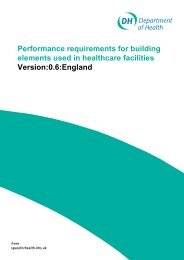Early Life Nutrition and Lifelong Health - Derbyshire Local Medical ...
Early Life Nutrition and Lifelong Health - Derbyshire Local Medical ...
Early Life Nutrition and Lifelong Health - Derbyshire Local Medical ...
You also want an ePaper? Increase the reach of your titles
YUMPU automatically turns print PDFs into web optimized ePapers that Google loves.
BMA Board of ScienceThere is another paradox in the data from the older cohorts, which needs to be investigated. HighBMI is a risk factor for cardiovascular disease <strong>and</strong> diabetes, but the relationships of infant weightgain to adult BMI <strong>and</strong> to adult disease are in opposite directions. The key to underst<strong>and</strong>ing thismay be to obtain better information about body composition in infancy. The Delhi study showedthat infant BMI gain was more strongly related to adult lean mass than to adult adiposity, whileBMI gain in later childhood was strongly related to adult adiposity. 19, 236 Infant weight gain inHertfordshire was associated with taller adult height <strong>and</strong> bone mineral content, 237 which wouldalso be associated with greater lean mass.Key messageSeveral studies of cardiovascular risk factors in children have shown higher blood pressure inthose who gained more weight during infancy. On the other h<strong>and</strong>, studies of adults haveshown a lower risk of cardiovascular disease <strong>and</strong> type 2 diabetes in those who gained moreweight during infancy. These apparently paradoxical findings need to be investigated further.There remain many unanswered questions. Most people would agree that normal infant weightgain should be protected, but should it be actively promoted or should catch-up or rapid weightgain be actively prevented? Is the answer to this question the same in all populations? And howmodifiable, in any case, is the weight gain of a healthy well-nourished <strong>and</strong> dem<strong>and</strong>ing infant?These are important questions, because infancy is an ‘accessible’ stage of life when optimalnutrition could have lifelong benefits. In developing countries, paediatricians generally try topromote catch-up weight gain <strong>and</strong> linear growth in small babies. There is good evidence that thisreduces infant mortality, improves growth <strong>and</strong> development <strong>and</strong> has lasting benefits on education<strong>and</strong> work attainment. 3, 125, 238 In more affluent countries such as the UK, getting infant nutritionright is likely to be an important element of efforts to prevent obesity <strong>and</strong> common causes ofdeath <strong>and</strong> disability such as cardiovascular disease <strong>and</strong> diabetes.Key messageGetting infant nutrition right has lasting benefits for growth <strong>and</strong> development, <strong>and</strong> isimportant in the prevention of obesity <strong>and</strong> chronic disease in adult life.48<strong>Early</strong> life nutrition <strong>and</strong> lifelong health



